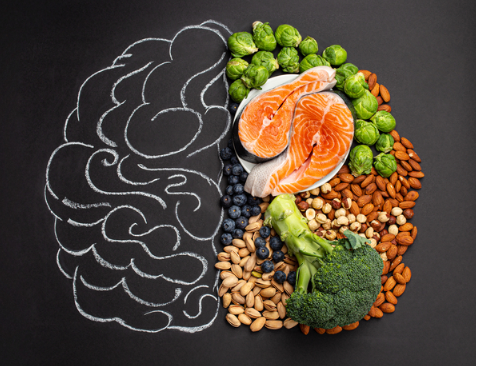Each year, one in five adults experience mental illness in the U.S., with anxiety and depression among the most common conditions. The number of people living with mental illness has been growing each year. Because of this, researchers continue to look to nutrition for answers. They want to find out how nutrition plays a part in the development and treatment of mental health conditions.
Growing evidence suggests that a balanced diet can reduce the risk of developing mental health disorders. For example, one study found that diet changes can help mental health. This includes eating more omega-3 fatty acids and certain vitamins and minerals. For example, following a Mediterranean diet gives the most mental health benefits.
This meals eating a lot of:
- Fruits
- Vegetables
- Whole grains
- Olive oil
- Fish
- Low-fat dairy
- Antioxidants
The opposite is a Western-style diet that has shown to be harmful to the brain. A Western-style diet includes eating red and processed meats, refined grains, sweets, high-fat dairy products, butter and potatoes, as well as eating a low amount of fruit and vegetables.
Mental well-being and the brain
A high-nutrient diet does the body and the brain good:
- Key for brain development. The food we eat becomes the protein-building blocks, enzymes, brain tissue and neurotransmitters. Those transfer information and signals between various parts of the brain and body.
- Creates changes in brain proteins that improve the connections between brain cells.
- Increases healthy gut bacteria. This promotes a healthy gut biome, which lowers inflammation. Brain inflammation (or swelling of the brain) affects mood and thinking. It is connected to almost every type of mental illness. Mood disorders from depression and anxiety to more serious conditions like autism, dementia and schizophrenia have all been linked to brain inflammation.
- Raises serotonin levels through various food enzymes, which improves mood.
Brain food
According to research, there are four main nutritional deficiencies in patients with mental disorders. They are omega-3 fatty acids, B vitamins, minerals and amino acids.
Let’s take a closer look at these nutrients, which can positively influence brain health.
- Omega-3s help keep the nervous system functioning properly. They also help balance the inflammatory pathway in the body.
Nutritional sources: Cold-water fish (salmon, sardines, tuna, and mackerel), nuts, seeds, green vegetables like spinach and Brussels sprouts
- B vitamins are key for a range of cellular and metabolic processes. They play a critical role in the production of a range of brain chemicals. People with low B12 levels have more brain swelling and higher rates of depression and dementia. A low level of folate (B9) has long been linked to low moods.
Nutritional sources: Fish/seafood, leafy greens, legumes, nuts, unprocessed meats, eggs, cheese, dairy
- Minerals like zinc, magnesium and iron have important roles in neurological function.
- Zinc helps control the body's response to stress. It is also a key element in supporting proper immune function. Low levels can cause depression.
Nutritional sources: Whole grains, oysters, beef, chicken, pork, beans, nuts and pumpkin seeds - Magnesium is involved in many brain chemistry reactions. Shortages have been linked to depressive and anxiety symptoms.
Nutritional sources: Leafy greens, nuts, seeds, dry beans, whole grains, wheat germ, wheat and oat bran - Iron is involved in many functional activities. Shortages are linked with depressive and anxiety symptoms. They have also been shown to lead to problems with development.
Nutritional sources: Beans and lentils, beef, oysters, chicken, turkey, tofu, cashews and green leafy vegetables
- Zinc helps control the body's response to stress. It is also a key element in supporting proper immune function. Low levels can cause depression.
- Amino acids are the building blocks of protein. They play an essential role in the production chemicals that help brain cells to communicate with each other. Deficiency in key amino acids can lead to depression and anxiety.
Nutritional sources: Meats, dairy, eggs, quinoa and soybeans
Research supports the link between nutrition and mental well-being. But there are many other factors that play a part in mental health too. According to MentalHealth.gov, these include biological factors like genetics or brain chemistry; life experiences like trauma or abuse; and a family history of health problems. Socioeconomic status can also affect mental health, as can access to food and overall diet quality.
Mom’s Meals® can help
An easy and convenient way to help get the right nutrition for you or your loved is with our delicious, ready-to-heat-and-eat meals delivered direct to your home. We have a variety of medically tailored meals, including heart- and diabetes-friendly options. Get started today.



